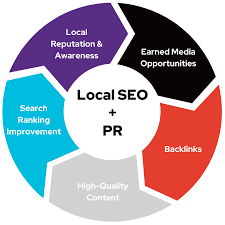Unlocking Online Success: The Vital Role of SEO Executives
The Role of SEO Executives in Driving Online Success
Search Engine Optimization (SEO) executives play a crucial role in helping businesses improve their online visibility and drive organic traffic to their websites. In today’s digital age, where competition is fierce and online presence is key, the expertise of SEO executives is more valuable than ever.
SEO executives are responsible for developing and implementing strategies to improve a website’s search engine rankings. They conduct keyword research, analyse website performance, and make recommendations for on-page and off-page optimization. By staying updated on search engine algorithms and best practices, SEO executives help businesses stay ahead in the ever-changing digital landscape.
One of the key tasks of SEO executives is to ensure that a website is easily discoverable by search engines. They work on improving website structure, optimizing content for relevant keywords, and building high-quality backlinks to increase domain authority. These efforts not only boost organic traffic but also enhance user experience, leading to higher engagement and conversions.
SEO executives also monitor website performance using tools like Google Analytics to track key metrics such as traffic sources, bounce rates, and conversion rates. By analysing this data, they can identify areas for improvement and make data-driven decisions to enhance overall online visibility and performance.
In addition to technical skills, successful SEO executives possess strong analytical abilities, creativity, and a passion for staying updated on industry trends. They collaborate with web developers, content creators, and marketing teams to ensure that SEO strategies are integrated seamlessly into broader marketing initiatives.
Ultimately, the role of SEO executives is not just about driving traffic but also about driving targeted traffic that leads to meaningful interactions with the brand. By continuously refining strategies based on data insights and industry best practices, SEO executives help businesses achieve sustainable online success in an increasingly competitive digital landscape.
If you’re looking to enhance your online visibility and drive organic traffic to your website, consider partnering with skilled SEO executives who can help you navigate the complexities of search engine optimization and achieve your digital marketing goals.
Understanding the Role and Impact of SEO Executives: FAQs Answered
- What is the role of an SEO executive?
- What skills are required to become an SEO executive?
- How does an SEO executive improve website rankings?
- What tools do SEO executives use for analysis and optimization?
- How important is the role of an SEO executive in digital marketing?
- What are the key responsibilities of an SEO executive?
- How can businesses benefit from hiring an experienced SEO executive?
What is the role of an SEO executive?
The role of an SEO executive is pivotal in enhancing a website’s visibility and driving organic traffic through strategic search engine optimization techniques. SEO executives are tasked with conducting keyword research, analysing website performance, and implementing on-page and off-page optimization strategies to improve search engine rankings. By staying abreast of search engine algorithms and industry best practices, SEO executives help businesses establish a strong online presence and attract targeted audiences. Their responsibilities also include monitoring website analytics, identifying areas for improvement, and collaborating with cross-functional teams to integrate SEO efforts seamlessly into broader marketing initiatives. Overall, the role of an SEO executive is essential in maximising online visibility, increasing user engagement, and driving conversions for businesses in the competitive digital landscape.
What skills are required to become an SEO executive?
To become a successful SEO executive, a combination of technical expertise, analytical skills, and creativity is essential. SEO executives should have a strong understanding of search engine algorithms and best practices, along with proficiency in keyword research, on-page and off-page optimization techniques, and website analytics tools. Additionally, excellent communication skills are crucial for collaborating with cross-functional teams and conveying SEO strategies effectively. Adaptability to evolving industry trends, problem-solving abilities to address algorithm changes, and a passion for continuous learning are also key attributes that can help aspiring SEO executives thrive in the dynamic field of search engine optimization.
How does an SEO executive improve website rankings?
An SEO executive improves website rankings by implementing a range of strategic techniques aimed at enhancing the website’s visibility and relevance to search engines. This includes conducting thorough keyword research to identify high-impact keywords, optimizing on-page elements such as meta tags, headings, and content with relevant keywords, and building high-quality backlinks from authoritative websites. Additionally, SEO executives focus on improving website speed, mobile-friendliness, and user experience to meet search engine requirements for ranking higher in search results. By staying abreast of search engine algorithms and best practices, SEO executives continuously refine their strategies to boost organic traffic and improve website rankings effectively.
What tools do SEO executives use for analysis and optimization?
SEO executives utilise a variety of tools for analysis and optimisation to enhance website performance and drive organic traffic. Some commonly used tools include Google Analytics for tracking key metrics like website traffic, user behaviour, and conversions. Keyword research tools such as SEMrush and Ahrefs help identify relevant keywords and assess competition levels. SEO executives also rely on tools like Moz and Majestic for backlink analysis to improve domain authority. Additionally, technical SEO tools like Screaming Frog aid in identifying website issues that may impact search engine rankings. By leveraging these tools effectively, SEO executives can make data-driven decisions to enhance online visibility and achieve optimal results for businesses in the digital landscape.
How important is the role of an SEO executive in digital marketing?
The role of an SEO executive in digital marketing is undeniably crucial. SEO executives are instrumental in enhancing a company’s online visibility, driving organic traffic, and ultimately boosting conversions. By developing and implementing strategic SEO initiatives, they ensure that a business’s website ranks higher on search engine results pages, making it more discoverable to potential customers. Their expertise in keyword research, content optimization, and link-building strategies directly impacts the success of digital marketing campaigns. In today’s competitive online landscape, the role of an SEO executive is paramount in helping businesses establish a strong online presence and reach their target audience effectively.
What are the key responsibilities of an SEO executive?
SEO executives play a pivotal role in enhancing a website’s online visibility and driving organic traffic through strategic search engine optimization techniques. Key responsibilities of an SEO executive include conducting thorough keyword research to identify relevant terms for optimization, analysing website performance metrics to track and improve search engine rankings, implementing on-page and off-page optimization strategies to enhance website visibility, and staying updated on search engine algorithms to adapt strategies accordingly. Additionally, SEO executives collaborate with cross-functional teams to ensure seamless integration of SEO efforts with broader marketing initiatives, ultimately working towards improving overall online presence and driving targeted traffic that leads to meaningful engagement and conversions.
How can businesses benefit from hiring an experienced SEO executive?
Businesses can benefit significantly from hiring an experienced SEO executive. With their expertise in search engine optimization strategies, keyword research, and website optimization techniques, SEO executives can help businesses improve their online visibility, drive organic traffic to their websites, and ultimately increase conversions and revenue. By staying abreast of the latest industry trends and search engine algorithms, experienced SEO executives can develop tailored strategies that align with a company’s specific goals and target audience. Their analytical skills enable them to track key metrics, identify areas for improvement, and make data-driven decisions to enhance overall online performance. By partnering with an experienced SEO executive, businesses can gain a competitive edge in the digital landscape and achieve sustainable growth in a highly competitive online market.




